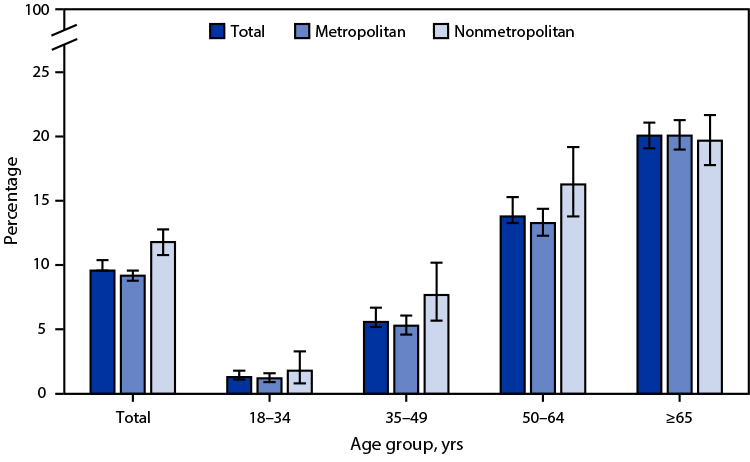QuickStats: Percentage* of Adults Aged ≥18 Years with Diagnosed Diabetes,† by Urbanization Level§ and Age Group — National Health Interview Survey, United States, 2022¶
Weekly / January 18, 2024 / 73(2);49
Altmetric:

* With 95% CIs indicated with error bars.
† Based on a positive response to the survey question, “Has a doctor or other health professional ever told you that you had diabetes?” Respondents were asked not to include prediabetes, borderline diabetes, or gestational diabetes.
§ Urbanization level is based on the Office of Management and Budget’s February 2013 delineation of metropolitan statistical areas (MSAs), in which each MSA must have at least one urbanized area of ≥50,000 inhabitants. Areas with <50,000 inhabitants are grouped into the nonmetropolitan category.
¶ Estimates are based on household interviews of a sample of the civilian, noninstitutionalized U.S. population.
In 2022, 9.6% of adults aged ≥18 years had diagnosed diabetes, with the percentage lower among adults living in metropolitan areas (9.2%) compared with adults in nonmetropolitan areas (11.8%). The prevalence of diagnosed diabetes was lower in metropolitan areas only among those aged 35–49 years (5.3% versus 7.7%) and aged 50–64 years (13.3% versus 16.3%). The prevalence of diagnosed diabetes increased with age overall, from 1.3% among adults aged 18–34 years to 20.1% among adults aged ≥65 years, and in both metropolitan and nonmetropolitan areas.
Source: National Center for Health Statistics, National Health Interview Survey, 2022. https://www.cdc.gov/nchs/nhis.htm
Reported by: Ellen A. Kramarow, PhD, ekramarow@cdc.gov; Nazik Elgaddal, MS.
Suggested citation for this article: QuickStats: Percentage of Adults Aged ≥18 Years with Diagnosed Diabetes, by Urbanization Level and Age Group — National Health Interview Survey, United States, 2022. MMWR Morb Mortal Wkly Rep 2024;73:49. DOI: http://dx.doi.org/10.15585/mmwr.mm7302a5.
MMWR and Morbidity and Mortality Weekly Report are service marks of the U.S. Department of Health and Human Services.
Use of trade names and commercial sources is for identification only and does not imply endorsement by the U.S. Department of
Health and Human Services.
References to non-CDC sites on the Internet are
provided as a service to MMWR readers and do not constitute or imply
endorsement of these organizations or their programs by CDC or the U.S.
Department of Health and Human Services. CDC is not responsible for the content
of pages found at these sites. URL addresses listed in MMWR were current as of
the date of publication.
All HTML versions of MMWR articles are generated from final proofs through an automated process. This conversion might result in character translation or format errors in the HTML version. Users are referred to the electronic PDF version (https://www.cdc.gov/mmwr) and/or the original MMWR paper copy for printable versions of official text, figures, and tables.
Questions or messages regarding errors in formatting should be addressed to mmwrq@cdc.gov.